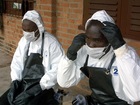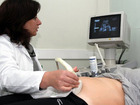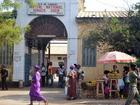Pakistani health teams will Sunday launch a drive to vaccinate some 750,000 children in the troubled northwest, with thousands of police guarding against attacks by militants who claim the polio campaign is a front for spying.
The campaign in Peshawar district, which covers Peshawar city and dozens of towns and villages, is the ninth phase of a push to eradicate polio in Pakistan, which along with Nigeria and Afghanistan are the only countries where the disease remains endemic.
 Full Story
Full Story
A male nurse has been charged with the murder of three patients who were poisoned with contaminated medical products at a British hospital, police said Saturday.
Eight patients died following the poisoning at Stepping Hill hospital in Stockport, near Manchester in northwest England, in June and July 2011.
 Full Story
Full Story
Guinea's capital Conakry was on high alert on Friday after a deadly Ebola epidemic which has killed dozens in the southern forests was confirmed to have spread to the sprawling port city of two million people.
Eight cases have been confirmed in the capital, the Guinean health ministry said late Friday, including one fatality.
 Full Story
Full Story
Having four or more children could be bad for a mother's heart, a U.S. study suggested Friday.
Plaque buildup, an early sign of heart disease, was far more common in women who had given birth to four or more children than in those who had two or three, according to the research presented at the American College of Cardiology conference.
 Full Story
Full Story
One in 68 U.S. children has autism, a 30 percent rise over the last estimate released in 2012, health authorities said Thursday.
The report by the Centers for Disease Control and Prevention raised concern and sparked calls for early screening, as well as more research and investment.
 Full Story
Full Story
The World Health Organization agency said Friday it had no plans to issue a travel warning for Guinea, even though a deadly Ebola outbreak has spread to the capital.
"Definitely, WHO does not recommend any travel or trade restrictions," said Gregory Hartl, a spokesman for the U.N. health agency.
 Full Story
Full Story
Bans on smoking in public and the workplace led to a 10 percent drop in premature births and in emergency asthma treatment for children, researchers said Friday.
The evidence, based on the records of more than two million children, comes from 11 published investigations into the impact of local or national smoking bans in the United States, Canada and four European countries.
 Full Story
Full Story
An artificial heart may help patients survive while awaiting a heart transplant, although the devices remain risky 10 years after they were approved, according to a U.S. study Thursday.
Researchers followed 22 patients with end-stage heart failure over the course of two months, to see how they responded to implantation with a Syncardia total artificial heart, the only such device that is approved by the U.S. Food and Drug Administration.
 Full Story
Full Story
People who are hospitalized in the United States risk acquiring healthcare-associated infections, which kill 75,000 patients per year, U.S. health authorities said Wednesday.
Many bacterial infections -- which can lead to serious complications from pneumonia and illnesses of the intestinal tract -- could be prevented if healthcare workers practiced common hygiene, said the Centers for Disease Control and Prevention.
 Full Story
Full Story
The brains of children with autism contain a built-in patchwork of defects, suggesting that the developmental disorder begins while they are growing in the womb, said a U.S. study Wednesday.
Researchers described their findings in the New England Journal of Medicine as "direct evidence" of a prenatal origin for autism, which affects as many as one in 88 children in the United States and has no known cure.
 Full Story
Full Story



